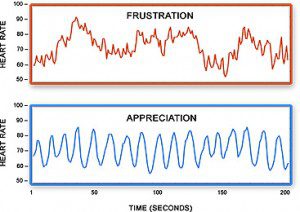An Appreciative Heart is Good Medicine
Psychologists once maintained that emotions were purely mental expressions generated by the brain alone. We now know this is not true. Emotions have as much to do with the heart and body as they do with the brain. Of all your body’s organs, it is the heart, a growing number of scientists theorize, that plays perhaps the most important role in our emotional experience. What we experience as an emotion is the result of the brain, heart, and body acting in concert.
Since its founding in 1991, HeartMath has been dedicated to decoding the underlying mechanics of stress. IHM’s Research Center is committed to the study of the heart and the physiology of emotions and has conducted many studies that identified the relationship between emotions and the heart. A number of HeartMath’s studies have contributed new insight to the scientific community’s understanding of how heart activity is linked to our emotions and health, vitality and well-being.
[pro_ad_display_adzone id=”110028″]
Emotions and the Heart
HeartMath studies define a critical link between the heart and brain. The heart is in a constant two-way dialog with the brain. Our emotions change the signals the brain sends to the heart and the heart responds in complex ways. Today we now know the heart sends more information to the brain than the brain sends to the heart, and the brain responds to the heart in many important ways. This research explains how the heart responds to emotional and mental reactions and why certain emotions stress the body and drain our energy. As we experience feelings like anger, frustration, anxiety and insecurity, our heart-rhythm patterns become more erratic. These erratic patterns are sent to the emotional centers in the brain, which recognizes them as negative, or stressful feelings. These signals create the actual feelings we experience in the heart area and elsewhere in the body. Erratic heart rhythms also block our ability to think clearly.
Many studies have found that the risk of developing heart disease is significantly increased for people who frequently experience stressful emotions such as irritation, anger or frustration. These emotions create a chain reaction in the body: stress-hormone levels increase, blood vessels constrict, blood pressure rises and the immune system is weakened. If we consistently experience these emotions, it can put a strain on the heart and other organs and eventually lead to serious health problems.
 Conversely, HeartMath’s research shows, when we experience heartfelt emotions such as appreciation, love, care and compassion, the heart produces a very different rhythm – one that has a smooth pattern and looks something like gently rolling hills. Scientists consider harmonious, or smooth heart rhythms, which are indicative of positive emotions, to be indicators of cardiovascular efficiency and nervous-system balance. This lets the brain know the heart feels good; often we experience this as a gentle, warm feeling in the area of the heart. Learning to shift out of stressful emotional reactions to these heartfelt emotions can have profound positive effects on our cardiovascular systems and overall health.
Conversely, HeartMath’s research shows, when we experience heartfelt emotions such as appreciation, love, care and compassion, the heart produces a very different rhythm – one that has a smooth pattern and looks something like gently rolling hills. Scientists consider harmonious, or smooth heart rhythms, which are indicative of positive emotions, to be indicators of cardiovascular efficiency and nervous-system balance. This lets the brain know the heart feels good; often we experience this as a gentle, warm feeling in the area of the heart. Learning to shift out of stressful emotional reactions to these heartfelt emotions can have profound positive effects on our cardiovascular systems and overall health.
As you begin to understand and appreciate the important link that exists between the heart and emotions, you’ll start to see how it is possible to shift the heart into a more efficient state by actually monitoring heart rhythms.
Being Appreciative Has its Benefits
The feeling of genuine appreciation is one of the most concrete and easiest positive emotions for individuals to self-generate and sustain for long periods. Nearly all of us can find something to genuinely appreciate. By simply recalling a time when you felt sincere appreciation and then re-creating that feeling, you can increase your heart-rhythm coherence, reduce emotional stress and improve your health. (Coherence here refers to a balance or smoothness in heart rhythms.)
Experts recommend that people who initially find it difficult to self-generate a feeling of appreciation in the present moment recall a memory that elicits warm feelings. With practice, most people can self-generate feelings of appreciation in real time and don’t need to recall something from the past. IHM Director of Research Dr. Rollin McCraty explains.
“It’s important to emphasize that it is not a mental image of a memory that creates a shift in our heart rhythms,” McCraty said, “but rather the emotions associated with the memory. Mental images alone usually do not produce the same significant results that we’ve observed when someone focuses on a positive feeling.”
Positive emotion-focused techniques, like those developed by HeartMath, can help individuals effectively replace stressful thoughts and emotional patterns with more positive perceptions and emotions. One of the long-term benefits of practicing these kinds of techniques is increased emotional awareness. This increased awareness can help individuals maintain a more consistent emotional balance, which is a fundamental step in improving cardiovascular health.
Diet and exercise certainly will always be paramount in keeping the heart healthy. There is a growing, awareness, however, that maintaining a healthy emotional state can also play an important role in maintaining a healthy heart, especially for people recovering from heart-related illnesses. Studies show that HeartMath’s positive-emotion-focused techniques reduce stress and anxiety, both of which are safe and effective ways of lowering blood pressure and increasing functional capacity in patients who have suffered heart failure. This is an approach that many hospitals and cardiac rehabilitation programs around the country began utilizing a number of years ago.
The demand for placing greater emphasis on emotional well-being has grown rapidly to include a great many applications, not only across the medical sector, but far beyond as well. Today many corporations, law-enforcement and corrections agencies, preschools and universities, teacher programs, churches, amateur and professional sports teams, U.S. military operations and nonprofit organizations subscribe to science-based programs incorporating emotion self-regulation techniques such as those developed by HeartMath scientists. These and many other entities in the United States and around the world are actively engaged in training, restructuring, policy-making, etc., to ensure that the emotional well-being of staff and management is an integral element in day-to-day operations.
Source – heartmath.org
[pro_ad_display_adzone id=”110027″]







